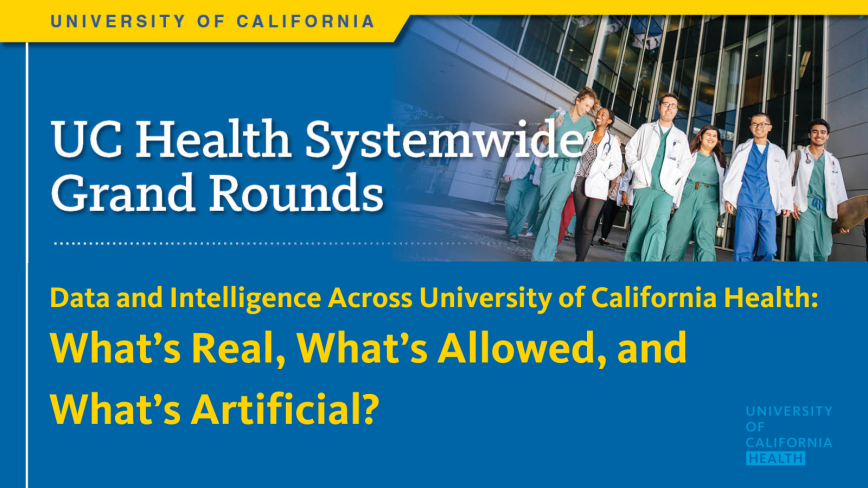There’s no doubt about it: artificial intelligence is here to stay. To support health care professionals navigating the intersections between AI and health care, University of California Health recently held a Grand Rounds panel discussion on the burgeoning world of artificial intelligence: “Data and intelligence across University of California Health: What’s real, what’s allowed, and what’s artificial?”
Over 400 people joined the discussion, with attendance from all six UC Health academic health centers and numerous other health care and government entities from across California and the country. The Grand Rounds panel focused on the legalities and governance surrounding AI applications, while also demystifying the use of AI within clinical settings. The conversation featured a panel of experts from across the UC health ecosystem:
- Atul Butte, M.D., Ph.D. (Chief Data Scientist, UC Health)
- Cora Han, J.D. (Chief Health Data Officer, UC Health)
- Sara Murray, M.D., MAS (Chief AI Officer, UCSF Health)
- Karandeep Singh, M.D., MMSc (Associate Chief Medical Information Officer of AI, Michigan Medicine; incoming Chief AI Officer, UC San Diego Health)
“We are in a transformative moment,” shared Han during the Grand Rounds discussion. “AI is not new. It has already had an impact on the health care delivery system, but now with generative AI there is a strong desire to develop and deploy tools. It's very exciting, yet also raises risk across critical areas and those include bias and equity, transparency, accountability, privacy and security … and also ethical issues."
Han continued, "However, AI governance can help mitigate this risk. Among other things, it can build trust with end users and those impacted, and those include patients, providers, administrators and community.”
Looking at AI in clinical settings
The December 5 Grand Rounds panel discussion was a deep-dive into the realm of data science and AI and its intersections with health care, exploring the tangible advances and implementations across the University of California Health ecosystem.
“At UCSF Health, we synergize with our operational leaders on key goals and priorities to identify the problems where AI could be most beneficial, and then we build and implement those tools in collaboration,” added Murray. “Multidisciplinary leaders from across UCSF IT came together to form an AI tiger team and build a HIPAA-compliant platform for the use of large language models in healthcare: UCSF Versa. Through Versa, we have been able to start testing clinical use cases in a safe and secure way.”
How academia is shaping AI usage and governance best practices
In addition to focusing on clinical use studies, panelists also talked about the role academia has in shaping AI usage, not only in California, but across health systems.
“A lot of these AI tools and technologies capture specific practice patterns, either as predictors or as outcomes, during their development,” said Singh. “And so, if you look at the same tool across many different centers, you will find just tremendous variation. You can imagine that the experience of the clinicians using these tools across different settings is going to be quite different. A lot of what's underlying these issues, I would argue, is a lack of transparency. So, at all levels, I think transparency is something to advocate for.”
Many of the insights and practices discussed throughout the Grand Rounds derived from the UC Health Data Governance Task Force, a systemwide task force organized by Center for Data-driven Insights and Innovation (CDI2). CDI2, which oversees the UC Health Data Warehouse, has been able to advance patient care and improve health outcomes across California through data-driven evidence. Outside of the Grand Rounds, UC Health experts continue to be called on for their expertise within the growing field of AI. On November 29, Christopher Longhurst, M.D., Chief Medical Officer, Chief Digital Officer and Association Dean of UC San Diego Health testified at a House of Representatives Committee on Energy and Commerce hearing “Understanding How AI is Changing Health Care.”
“I think one of the most amazing things about AI is that it's really pulling together teams institutional review boards, chief information security officers, new chief AI officers,” added Butte.
“It’s a very multidisciplinary process to create these models as well as inbound them and steward them. Clearly, it's not a kind of tool that we install and forget about. These are going to need constant monitoring. And what an exciting time we see ahead,” said Butte.
Those interested in watching the December 5 Grand Rounds can view it on this recording. The next UC Health Grand Rounds will take place on February 7, 2024, and the topic will be “Challenges and Opportunities for Optimizing the Contributions of Nurses for the Future.”
About University of California Health
University of California Health comprises six academic health centers, 20 health professional schools, a Global Health Institute and systemwide services that improve the health of patients and the University’s students, faculty and employees. All of UC’s hospitals are ranked among the best in California and its medical schools and health professional schools are nationally ranked in their respective areas.

